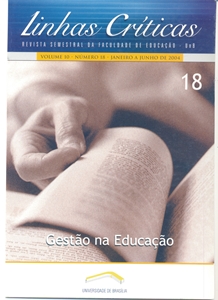Conselho gestor como elemento de gestão democrática e de controle social de políticas educacionais
DOI:
https://doi.org/10.26512/lc.v10i18.3194Keywords:
Gestão democrática;, Conselho gestor;, Política educacional;, Participação socialAbstract
Este trabalho analisa a participação da sociedade organizada na gestão democrática de políticas públicas educacionais por meio de conselhos de controle social. Retoma o processo de democratização da educação brasileira a partir de seus estágios constituídos na luta pela universalização do acesso, pela qualidade do ensino e pela alteração nas estruturas de poder das escolas e dos sistemas de ensino. Procura demonstrar que os conselhos de controle social de políticas educacionais induzidos pela Constituição Federal de 1988 são um importante elemento da gestão democrática da educação, na medida em que se abrem para a participação da sociedade. O conselho de controle social do Programa Bolsa-Escola é tomado como exemplo para apontar a natureza que devem assumir esses coletivos de participação para serem considerados, de fato, mecanismos de gestão democrática.
Downloads
Downloads
Published
How to Cite
Issue
Section
License
Copyright (c) 2016 Linhas Críticas

This work is licensed under a Creative Commons Attribution 4.0 International License.
Authors who publish in this journal agree to the following terms:
-Authors maintains the copyright and grants the journal the right of first publication, the work being simultaneously licensed under the Creative Commons Attribution License which allows the sharing of the work with recognition of the authorship of the work and initial publication in this journal.
- Authors are authorized to enter into additional contracts separately, for non-exclusive distribution of the version of the work published in this journal (eg publish in institutional repository or as a book chapter), with acknowledgment of authorship and initial publication in this journal.
-Authorers are allowed and encouraged to publish and distribute their work online (eg in institutional repositories or on their personal page) at any point before or during the editorial process, as this can generate productive changes as well as increase the impact and the citation of published work (See The Effect of Free Access).



